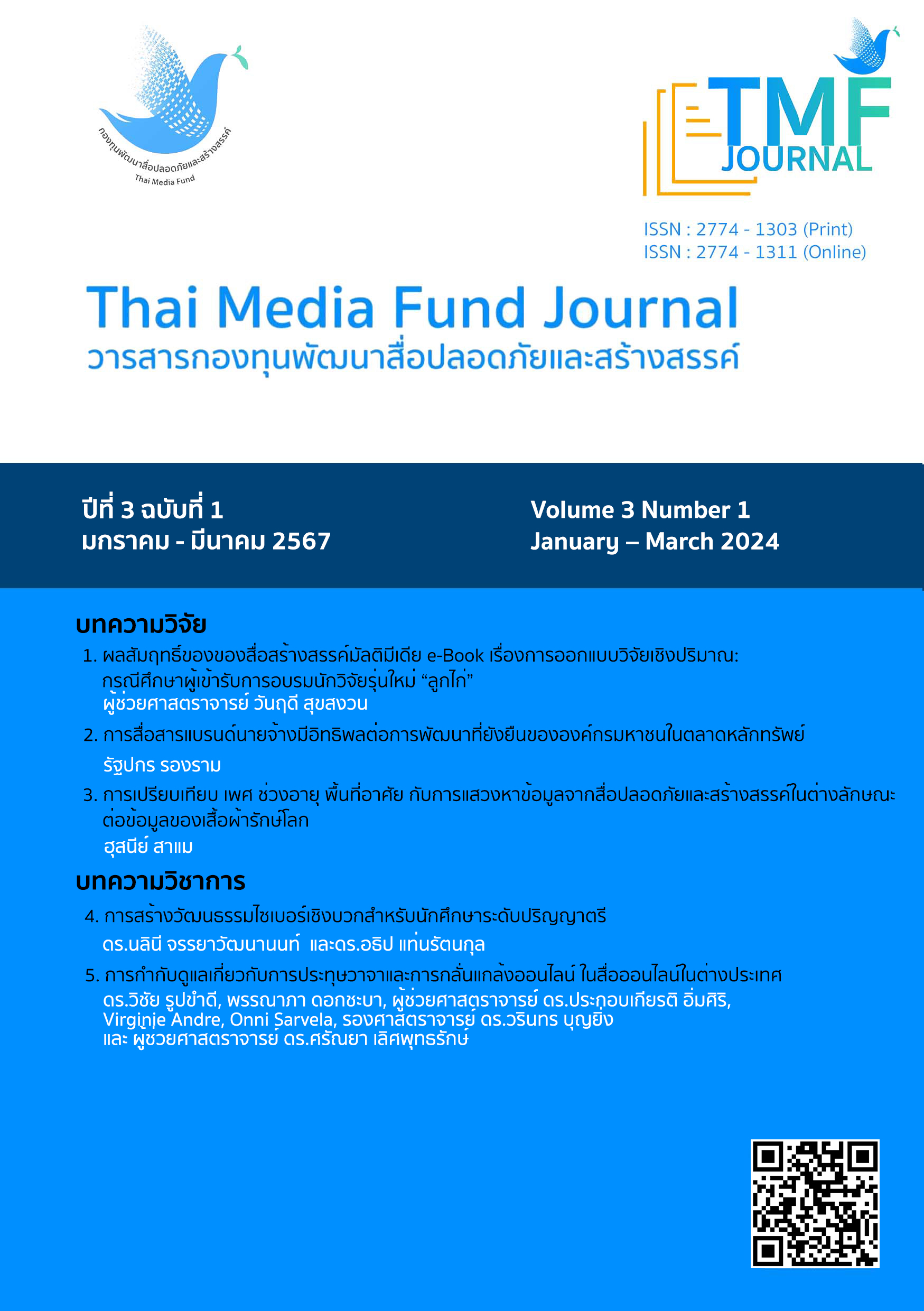การกำกับดูแลเกี่ยวกับการประทุษวาจาและการกลั่นแกล้งออนไลน์ ในสื่อออนไลน์ในต่างประเทศ -
Main Article Content
บทคัดย่อ
การตอบสนองต่อการประทุษวาจาและการกลั่นแกล้งออนไลน์ แตกต่างกันไปในแต่ละประเทศ ปัญหาความรุนแรงของประทุษวาจาในสื่อออนไลน์นั้น ทวีเพิ่มขึ้นมากจนนำไปสู่ความรุนแรง การฆ่าล้างเผ่าพันธุ์ การถูกกีดกันทางด้านสิทธิมนุษยชน จนกระทั่งหลายประเทศ ที่แม้จะเป็นประเทศที่ให้ความสำคัญกับเสรีภาพในการแสดงความคิดเห็น ยังต้องเริ่มมีการกำกับควบคุมการแสดงออกในสื่อออนไลน์ โดยจะมีการบัญญัติกฎหมายและมาตรการในการกำกับดูแลการกระทำความผิดที่สอดคล้องกับสนธิสัญญาด้านสิทธิมนุษยชนระหว่างประเทศ การพัฒนาแนวปฏิบัติที่ดี และมาตรฐานทางจริยธรรมจะประสบความสำเร็จได้ต้องรับความร่วมมือจากสื่อมวลชน ผู้ใช้งานสื่อออนไลน์ทั่วไป ผู้ให้บริการแพลตฟอร์ม และภาคส่วนอื่น ๆ ที่เกี่ยวข้องในระบบนิเวศการสื่อสารออนไลน์ ต้องมีการสร้างพันธมิตรในการป้องกันและต่อต้านความรุนแรงที่อาจเกิดจากประทุษวาจาและการกลั่นแกล้งออนไลน์ ซึ่งจะมีประสิทธิภาพมากกว่าการโต้ตอบด้วยการบังคับใช้กฎหมายเพียงอย่างเดียว
Article Details

อนุญาตภายใต้เงื่อนไข Creative Commons Attribution-NonCommercial-NoDerivatives 4.0 International License.
เอกสารอ้างอิง
Asia Centre. (2020). Hate speech in Southeast Asia new forms, old rules. Retrieved from file:///C:/Users/User/Downloads/Hate-Speech-in-Southeast-Asia-New-Forms-Old-Rules1.docx%20(1).pdf
Council on Foreign Relations. (2019). Hate speech on social media: Global comparisons. Retrieved from https://www.cfr.org/backgrounder/hate-speech-social-media-global-comparisons
eMORE. (2016). eMORE: MOnitoring and REporting online hate speech in Europe. Retrieved from https://www.mirovni-institut.si/en/projects/emore-monitoring-and-reporting-online-hate-speech-in-europe/
Henares-Montiel, J., Benítez-Hidalgo, V., Ruiz-Pérez, I., Pastor-Moreno, G., & Rodríguez-Barranco, M. (2022). Cyberbullying and associated factors in member countries of the European Union: A systematic review and meta-analysis of studies with representative population samples. International Journal of Environmental Research and Public Health, 19, 1-13.
Iginio, G., Danit, G., Thiago, A., & Gabriela, M. (2015). Countering online hate speech. Retrieved from https://unesdoc.unesco.org/ark:/48223/pf0000233231
Kid Stop Press. (2022). Shocking: Indian kids are the most cyberbullied in the world. Retrieved from https://kidsstoppress.com/shocking-indian-kids-are-the-most-cyberbullied-in-the-world/
New York Tim. (2018). Facebook fueled anti-refugee attacks in Germany, new research suggests. Retrieved from https://www.nytimes.com/2018/08/21/world/europe/facebook-refugee-attacks-germany.html
New York Time. (2018). In Sri Lanka, facebook contends with shutdown after mob violence. Retrieved from https://www.nytimes.com/2018/03/08/technology/sri-lanka-facebook-shutdown.html.
Office of National Statistics. (2020). Online bullying in England and Wales: Year ending March 2020. Retrieved from file:///C:/Users/USER/Downloads/Online%20bullying%20in%20England%20and%20Wales%20year%20ending%20March%202020.pdf
Petrov, C. (2022). 50 alarming cyberbullying statistics to know in 2022. Retrieved from https://techjury.net/blog/cyberbullying-statistics/#gref
Statista Research Department. (2022). Most common platforms for cyberbullying in Europe 2018. Retrieved from https://www.statista.com/statistics/941005/europe-most-common-platforms-for-cyberbullying/
The Print. (2022). 85% Indian kids have experienced cyberbullying, highest in the world, finds new survey. Retrieved from https://theprint.in/india/85-indian-kids-have-experienced-cyberbullying-highest-in-the-world-finds-new-survey/1074175/
The Washington Post. (2018). How online hate turns into real-life violence. Retrieved from https://www.washingtonpost.com/nation/2018/11/30/how-online-hate-speech-is-fueling-real-life-violence/
VOA. (2022). US big city hate crimes spiked by 39% in 2021, report finds. Retrieved from https://www.voanews.com/a/us-big-city-hate-crimes-spiked-by-39-in-2021-report-finds-/6571116.html


